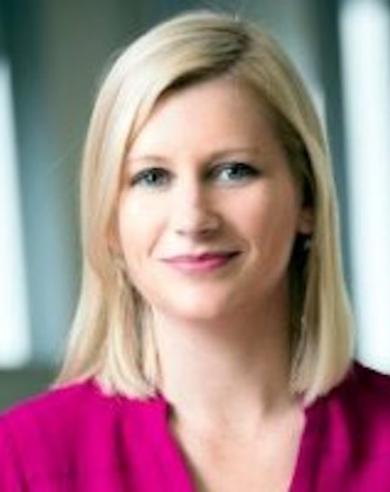Leader Spotlight: Kelsey Campbell
As part of United Religions Initiative North America’s #TangibleHope campaign, Veterans for American Ideals is recognizing veteran leaders who are continuing their service by building unity and standing up for American values. Through a series of interviews, we’re asking VFAI leaders to share more about how their service shaped them and what responsibility they feel veterans have to speak up on issues that relate to our national ideals.
Today’s interview is with Kelsey Campbell, a U.S. Air Force veteran and former Pentagon advisor, currently a Tony Patiño Fellow at UC Hastings College of the Law.
Tell me about your military service.
I served in the Air Force from 2002 to 2009 as a Russian linguist and intelligence analyst. I served in an intelligence squadron at Elmendorf AFB in Anchorage, Alaska. In an attempt to escape yet another Alaskan winter, I volunteered to deploy and was sent to lead a small, specialized intelligence mission in East Baghdad, Iraq during the surge in 2007-2008 within the Army’s 3rd Infantry Division. I feel very fortunate to have had the opportunity to serve overseas. I worked with several coalition countries on my mission area and learned a lot about my sister services.
I was one of only a handful of women deployed on the base within the infantry division. I came to know a local Iraqi interpreter who served with the civil affairs teams. We became friends on base and kept in touch when I redeployed. She eventually qualified to migrate to the United States under the Special Immigrant Visa program. She is now a college graduate, lives in Southern California, and volunteers with the Syrian refugees who are settled in the San Diego area.
How did your service shape the person you are today?
Serving in the military exposed me to a wide cross section of America and to different cultures. I grew up in a small California beach town in a modest, single-parent household. I had not traveled extensively before joining the Air Force. I was a top student in school, but my understanding of the different cultures and viewpoints in America was limited.
Serving in the military exposes you to a lot of American history. Our bases are named after historical figures and our unit insignia and flags memorialize historical battles and moments in history. I learned about the founding of the Air Force, the Navajo code talkers, and the Tuskegee Airmen. As a woman in the military, it became really clear the small role that women had in the history of America for far too long.
Upon research, I learned that many courageous women participated in every battle since the Revolutionary War, though their participation was often disguised or hidden. I am proud to have been a part of establishing a new history of American women serving in the 21st century. Today, women are the fastest growing segment of the population who are choosing to serve in uniform, and many are also choosing to continue their service to the community after taking off the uniform.
As a veteran, what sort of responsibility do you feel to speak up on issues that relate to American ideals?
Initially when I separated from the military, I had planned to leave that identity behind and start anew as a civilian. I have since learned, though, that we are forever changed because of our service and it’s not that easy to separate those experiences.
Veterans have opportunities and experiences to serve America in challenging environments and I believe we owe it to our nation to communicate our experiences and lessons learned. Like most veterans, there are certain sights, sounds, smells that I will never forget. Because I have lived and served in countries that have experienced instability and the breakdown of institutions, I am that much more attune to precursors to such events occurring in America or other countries.
Tell me about one issue related to those ideals that is of particular importance or concern to you right now. What are you doing about it?
I am passionate about development—this basically encompasses all the areas outside of armed conflict, e.g. economic development, social development (heath care, education, civil society), and basic institutions (a judiciary, functioning government to provide service delivery). Armed conflict is what results when there is a breakdown in these other areas or when there is a dispute with another country and various dispute resolution methods failed. Armed conflict is a last resort method to end a dispute, but can do very little to rebuild societies.
Today the military and veterans are given a big platform to speak on world affairs, but I feel there is not enough use of this platform to discuss the other tools of development that are so vital to creating lasting peace and stability throughout the world.
Traditionally, the Western approach to stemming armed conflict was through deterrence and using arms of our own. However, as has become more widely known in the last decade, other investments end up producing much higher peace dividends. For example, family planning services, education for girls, solar power, and new agricultural practices increase livelihoods for people around the world, reduce the demand over scarce resources, and thereby reduce the chance of armed conflict.
What would you say to other veterans about the role that they can play in these issues as citizens?
I encourage other veterans to survey all of their experiences in the military and focus on one or two areas that really resonate. Conduct research, read books, volunteer, intern, etc, to expand your knowledge and experience in these areas. In the military we gain great experience, but we primarily only see global issues through a security lens. Through expanding our viewpoints, we can start to see a more cohesive picture and thereafter will be able to use our talents and enthusiasm to work for the greater good.


